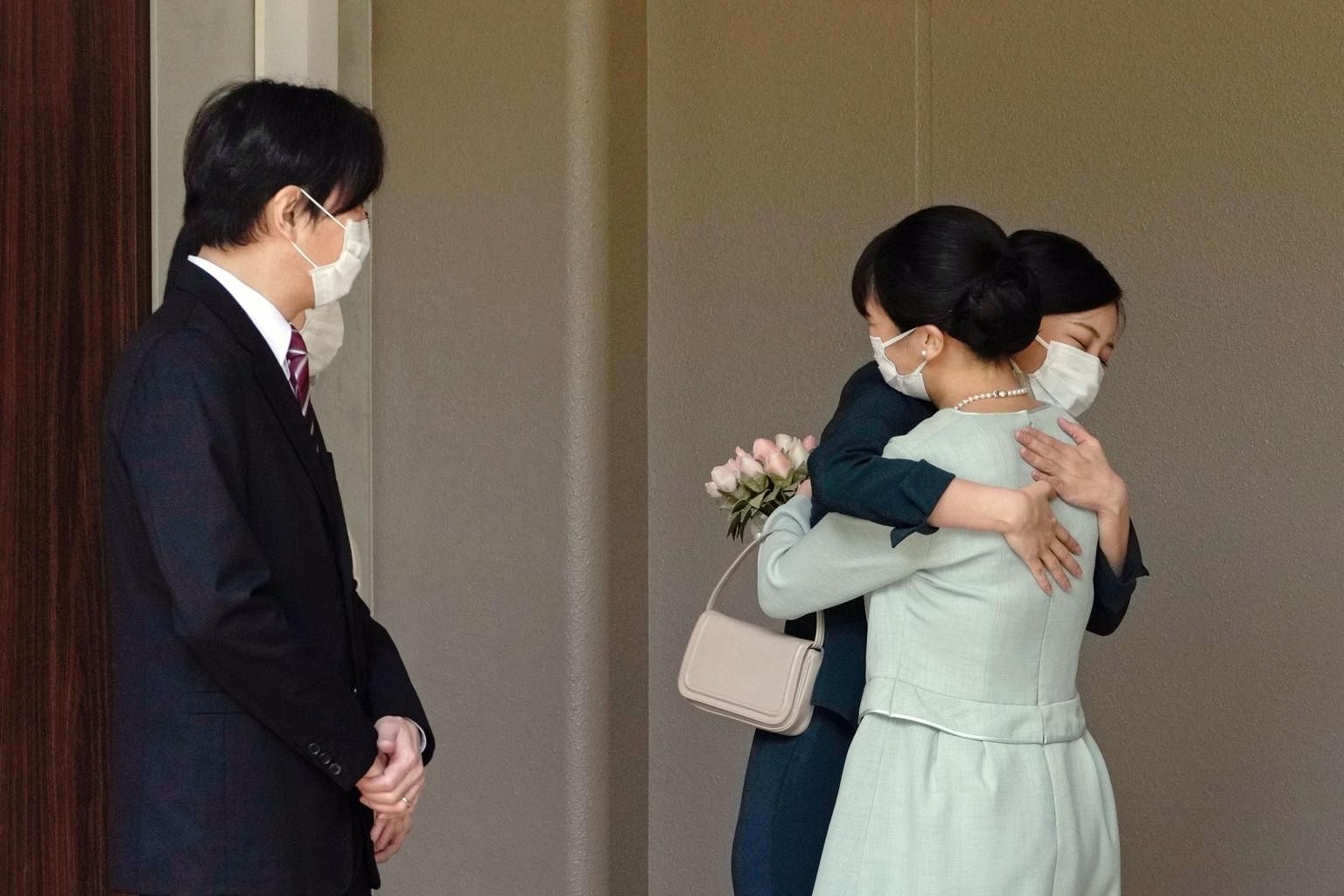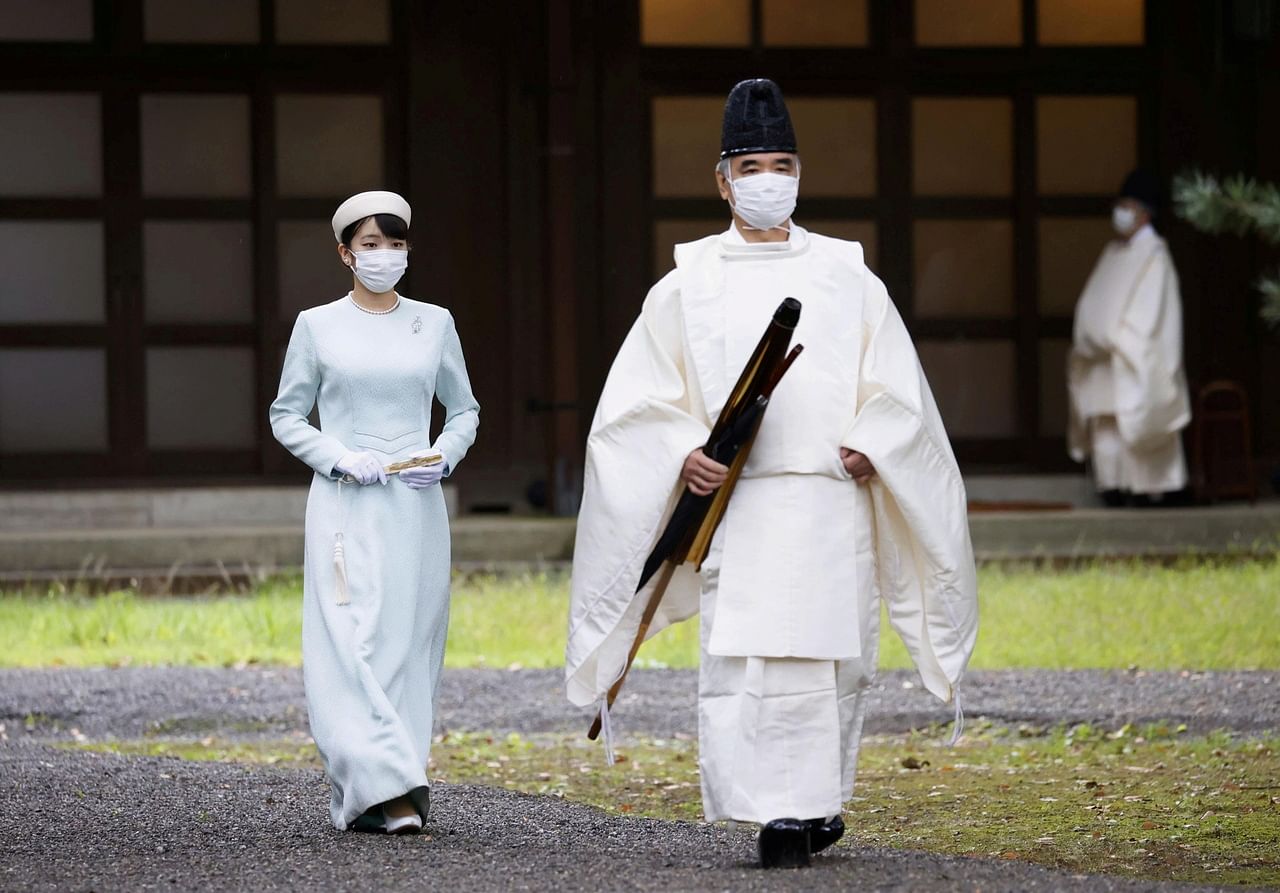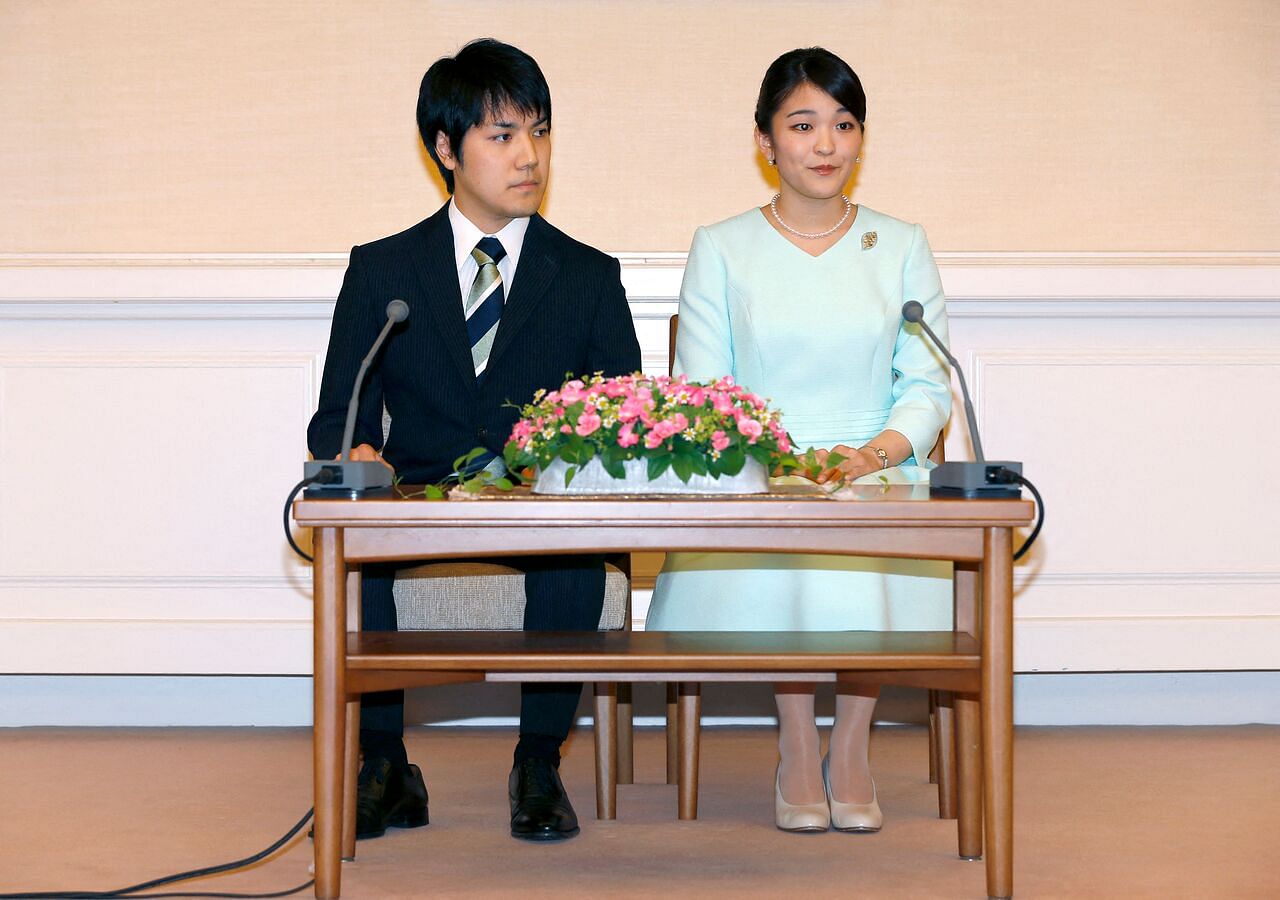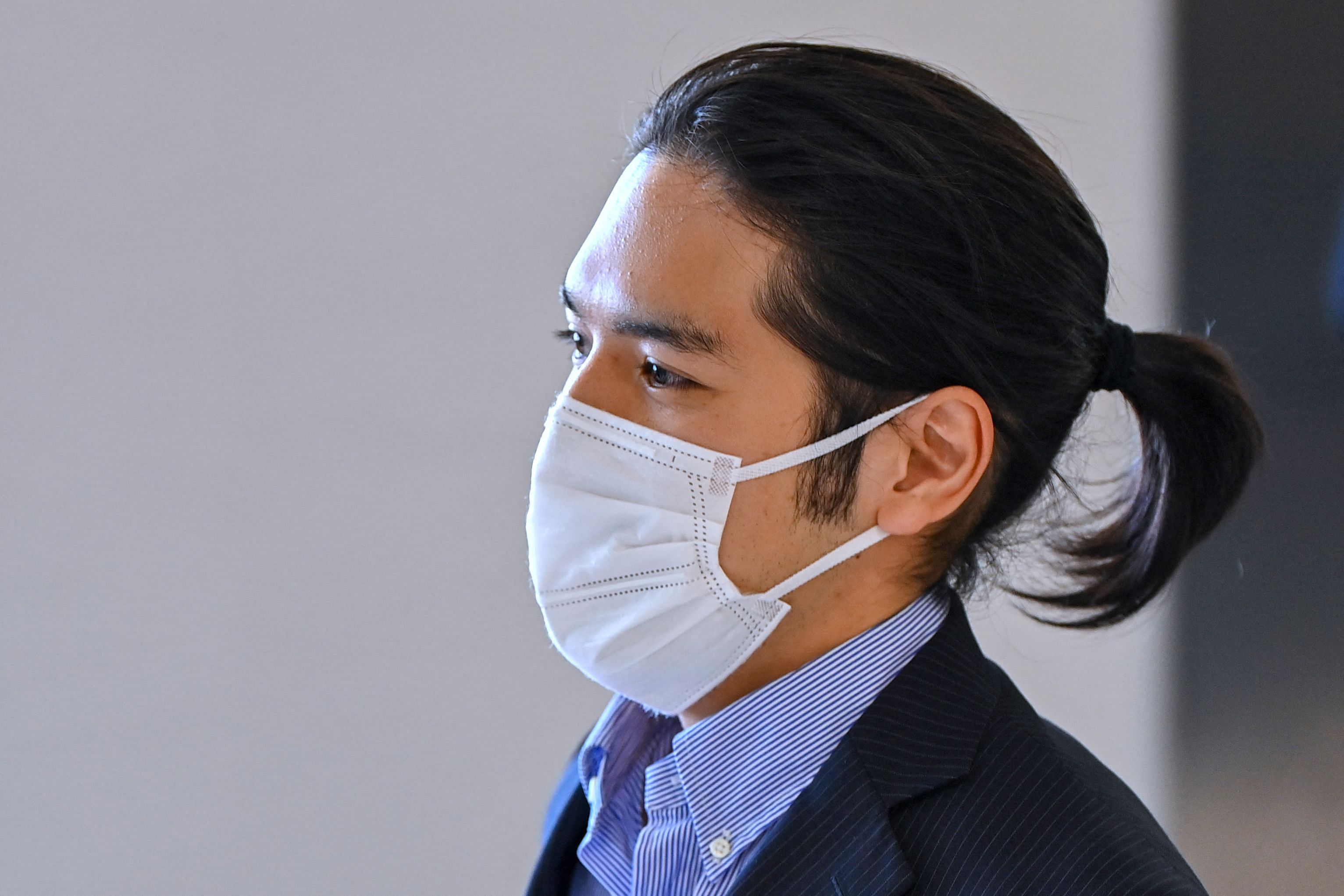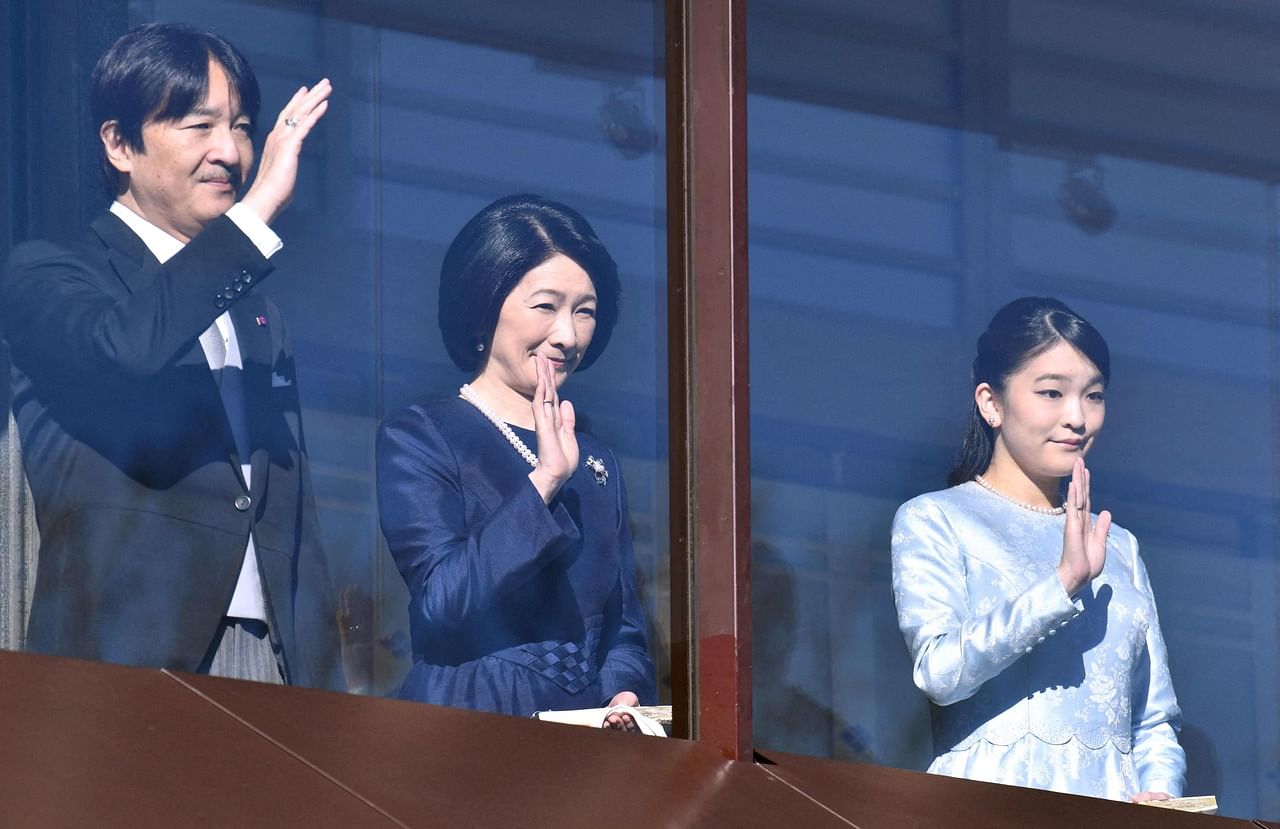Japan's Princess Mako marries college sweetheart in low-key affair and becomes commoner
TOKYO – Japan’s Princess Mako, the eldest niece of Emperor Naruhito, married her university sweetheart on Tuesday (Oct 26) morning in a stripped-down, low-key administrative affair.
The event took place amid public unease over their union, with controversy and malicious gossip swirling around her union with up-and-coming lawyer Kei Komuro, a commoner who was raised by a single mother.
An Imperial Household Agency (IHA) staff submitted legal papers to register the marriage on behalf of the couple, both 30, with all traditional marriage rituals and ceremonies scrapped.
The nuptials mean Mako has shed her “Princess” title to become Mrs Mako Komuro, departing the imperial family as per Japanese law that states that princesses will lose their royal status and become commoners when they marry a non-royal.
Controversy has swirled around their marriage, and vicious opprobrium has reared its ugly head through anonymous missives that caused the former princess to be diagnosed with complex post-traumatic stress disorder (PTSD).
The newlyweds will meet the press at 2pm (1pm in Singapore) on Tuesday at a Tokyo hotel, where they will deliver an opening statement but take no questions.
Mr Komuro, clad in a dark striped suit, left his home in Yokohama at about 8.30am, bowing to waiting reporters before making his way to the hotel where he was due to meet his wife.
His wife, meanwhile, left her residence at the Akasaka Palace at around 10am for the hotel. She was seen off by her parents – Crown Prince Akishino and Crown Princess Kiko – and her younger sister Princess Kako, with whom she exchanged a tight embrace.
The IHA said on Monday that the newlyweds will, in lieu of a question-and-answer at the press conference, distribute written answers to five questions that were submitted beforehand. The move was aimed at shielding the former princess who felt “a strong sense of anxiety” by just imagining having to answer the questions verbally.
The agency added that the former princess was shocked to see that some of the questions had included “false information being presented as fact”.
The wedding, with traditional rituals scrapped and the pomp and pageantry all but done away with, has polarised the Japanese public. While many have given the couple their blessing, others have questioned Mr Komuro’s character and whether his background was befitting of a man who marries a royal.
In lieu of the cancelled ceremonies, Mako spent her last days as Princess meeting privately with Emperor Naruhito and Empress Masako as well as with Emperor Emeritus Akihito and Empress Emerita Michiko.
The couple first met in 2012, when they were college schoolmates at the International Christian University (ICU) in Tokyo.
They kept their relationship under wraps with discreet dates until news of the engagement broke in 2017. The couple had, earlier on, gained overwhelming support for their union, with Mr Komuro charming the public through positive reports as an earnest young man who liked to cook, ski and play the violin.
The IHA had at the time described Mr Komuro as a “truly respectable person who is a suitable marriage partner for Princess Mako”.
But support quickly turned sour that same year – with their engagement scrapped and their planned wedding on Nov 4, 2018, called off – after tabloid reports surfaced that Mr Komuro’s mother was allegedly in financial trouble with her ex-fiance.
The alleged debt of 4 million yen (S$47,400) was made around 2010. The Komuros said this was a gift that the ex-fiance is now trying to claw back after the relationship went south around 2012.
The scandal, which the IHA has stayed away from commenting about on the basis that it was a “private matter”, hoarded column inches with Mr Komuro’s character impugned and Princess Mako psychologically wounded.
The ugly dispute has played out through tabloid reports for the past three years. Mr Komuro rebutted the ex-fiance in a 28-page statement in April that was full of legal jargon, only for the ex-fiance to say this month that the financial issue was far from resolved.
The negative headlines have also seemingly made a villain out of Mr Komuro despite what on paper are solid credentials: of a man whose father died when he was young and had worked his way through school, overcoming the odds to become a promising lawyer.
He left Japan for New York in 2018, at the height of the financial scandal, when he enrolled in the prestigious Fordham University law school. This May, he graduated with a juris doctor degree while results for the New York State Bar exam are due in weeks.
Separately, last week, the New York State Bar Association announced that Mr Komuro won a thesis competition for his essay titled Compliance Problems In Website Accessibility And Implications For Entrepreneurs.
Mr Komuro stayed away from Japan – with the couple having to endure a long-distance relationship – until he returned on Sept 27 to prepare for the wedding.
He further set tongues wagging with his long hair tied back into a ponytail, which has since been lopped off for the big day.
Their union has also been met with unease within the morally-impeccable imperial family that has done its best to steer clear of controversy and negative headlines.
Mako’s father Crown Prince Akishino said he supports the union “if this is truly what they want” on the basis of the Japanese Constitution that is based on “mutual consent” of the couple, even as he is apprehensive of how it is being seen by the public.
Her mother, Crown Princess Kiko, admitted last month: “As a parent, I have been talking to Mako to understand her standpoint. While there are areas where I empathise with her and other areas where we hold opposite views, I have expressed what is necessary with the wish of also respecting her feelings.”
The couple’s relocation to New York also present the best chance for them to forge a new life away from the public eye.
The former princess, who has turned down a 152.5 million yen lump sum payout in taxpayers’ money for females who leave the imperial family, will move out of the Akasaka Palace into a private condominium with Mr Komuro.
She will first have to settle paperwork associated with a commoner, including the setting up of a family registry with Mr Komuro that is a prerequisite for the application of a passport.
The couple will then relocate to New York, where Mr Komuro has found work at a law firm.
Perhaps it will be in New York that their dreams, stated in 2017, can be realised. Mr Komuro had envisioned their ideal home to be “relaxed and peaceful” while the then-Princess had dreamt of building a “warm, cosy home that is full of smiles”.
Join ST’s Telegram channel here and get the latest breaking news delivered to you.
Source: Read Full Article
